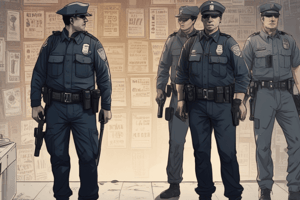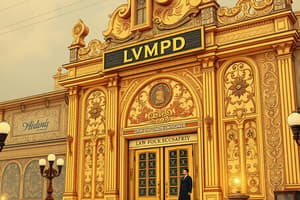Podcast
Questions and Answers
Which behavior is NOT typically considered police corruption?
Which behavior is NOT typically considered police corruption?
- Conducting a lawful search (correct)
- Accepting bribes
- Confiscating drugs or drug money
- Planting evidence
What does emotional dissonance primarily refer to in law enforcement?
What does emotional dissonance primarily refer to in law enforcement?
- The challenge of managing stress after critical incidents.
- The inability to empathize with victims.
- Inconsistencies between emotions felt and emotions projected. (correct)
- The pressure to conform to public expectations.
What is one primary finding from the study conducted by the Defense Personnel Security Research Center?
What is one primary finding from the study conducted by the Defense Personnel Security Research Center?
- Boredom is not a significant stressor for police officers
- Police misconduct is more common later in an officer's career
- Personality measures are not predictive of misconduct
- Misconduct happens more after employment has begun (correct)
Which of the following factors is considered a source of occupational stress for law enforcement officers?
Which of the following factors is considered a source of occupational stress for law enforcement officers?
Which of the following best describes community-oriented policing?
Which of the following best describes community-oriented policing?
Who was noted as the first in-house psychologist for police agencies?
Who was noted as the first in-house psychologist for police agencies?
What are critical incidents in the context of law enforcement?
What are critical incidents in the context of law enforcement?
Which policing practice is often criticized as a form of racial or ethnic profiling?
Which policing practice is often criticized as a form of racial or ethnic profiling?
What is role conflict as it relates to law enforcement officers?
What is role conflict as it relates to law enforcement officers?
What is the primary function of a companion officer?
What is the primary function of a companion officer?
Flashcards are hidden until you start studying
Study Notes
Law Enforcement Terms and Definitions
- Emotional dissonance refers to the gap between genuine feelings and emotions expressed by individuals, particularly law enforcement officers (LEOs).
- LEOs often avoid discussing psychological issues, viewing it as weak or unacceptable to seek help.
- Post shooting traumatic reactions (PSTR) include various emotional and psychological responses triggered by a shooting incident while on duty.
- Role conflict arises when LEOs are expected to perform duties beyond traditional policing, like social work and public service.
- Community-oriented policing aims to foster collaboration between law enforcement and the community, enhancing public trust and cooperation.
- Critical incidents encompass severe events, including shootings, suicides, or the death of children, which can profoundly impact officers.
- A companion officer is a trusted colleague who has been involved in a shooting incident, offering support to a fellow officer.
Police Corruption
- Police corruption involves illegal activities that breach public trust, such as accepting bribes, drug confiscation, and evidence tampering.
- The Defense Personnel Security Research Center highlights that police misconduct often increases after initial employment and early in an officer's career.
Occupational Stress
- Key stressors for officers include boredom and exposure to violent situations, leading to mental health concerns.
Psychological Assessment in Law Enforcement
- Martin Reiser is noted as the first psychologist involved in police assessments.
- "Stop and frisk" is often criticized as a form of racial/ethnic profiling.
Validity in Psychological Measures
- Validity ensures that tests measure what they claim, including concurrent validity (current performance) and predictive validity (future outcomes).
- Face validity assesses whether a measure appears relevant to its intended purpose.
Police Culture and Job Analysis
- Ride along programs provide psychological insights by allowing individuals to accompany officers on patrol.
- Job analysis identifies necessary skills and competencies essential for law enforcement functions.
Critical Incidents and Stress Management
- Critical Incident Stress Debriefings (CISD) are temporary group sessions intended to alleviate stress but may not prevent PTSD.
Factors Contributing to Police Suicides
- Key factors include financial difficulties, accessibility of weapons, and substance abuse issues.
Hostage Situations
- Hostage scenarios can be motivated by political, personal, or material gains, impacting negotiation strategies.
Minnesota Multiphasic Personality Inventory (MMPI-2)
- MMPI-2 is widely utilized for selecting LEO candidates to assess psychological well-being and suitability for service.
Fitness for Duty Evaluation (FFDE)
- FFDEs assess an officer's mental and physical fitness, identifying behaviors such as mood swings or suicidal tendencies, without the need for disclosure to the LEO.
Excessive Force and Its Psychological Aspects
- Excessive force, a form of police brutality, involves utilizing more force than necessary, influenced by factors like lack of empathy and early career issues.
Police Cynicism
- Cynicism develops from officers consistently encountering the worst of humanity, leading to distrust in the public's integrity.
Agency Culture Influence
- The culture within law enforcement agencies can implicitly encourage excessive force, making early identification of problem officers essential.
Key Terms in Law Enforcement Psychology
- Cognitive rigidity hinders flexible thinking in high-stress roles.
- Crisis negotiation involves broader strategies beyond hostage scenarios, focusing on comprehensive communication tactics.
Types of Stress in Law Enforcement
- Six categories of stress include organizational, task-related, external, and personal stress, each affecting officers differently throughout their careers.
Police Safety Psychology
- A partnership between police practices and psychological evaluation emerged, recognizing the importance of mental health in policing.
- In 2011, the American Board of Professional Psychology established a specialty board for police safety psychology.
- Pre-employment psychological screenings are mandated in 38 states, emphasizing the need for mental wellness among officers.
- The "thin blue line" represents the solidarity among officers, often distancing them from the community they serve.
Studying That Suits You
Use AI to generate personalized quizzes and flashcards to suit your learning preferences.




